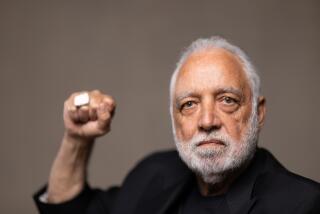The Rev. James L. Bevel dies at 72; civil rights activist and top lieutenant to King
Reporting from Washington — The Rev. James L. Bevel, a fiery top lieutenant of the Rev. Martin Luther King Jr. and a force behind civil rights campaigns of the 1960s whose erratic behavior and conviction on incest charges tarnished his legacy, has died. He was 72.
Sherrilynn Bevel, a daughter, said he died of pancreatic cancer Dec. 19 at her home in Springfield, Va. She said Bevel, who was freed on bond because of ill health, had been there since Nov. 8.
“Jim Bevel was Martin Luther King’s most influential aide,” said civil rights historian David Garrow. He cited Bevel’s “decisive influence” on the Birmingham “children’s crusade” of 1963 that helped revive the movement, the voting rights march from Selma to Montgomery in 1965 and King’s increased outspokenness against the Vietnam War.
Bevel, an ordained Baptist minister, came to prominence when he was Alabama project coordinator for the Southern Christian Leadership Conference, a civil rights organization led by King.
In the early 1960s, the SCLC campaigned to desegregate Birmingham’s downtown stores, which led police Commissioner Eugene “Bull” Connor to respond with police attack dogs and fire hoses turned at full blast against the peaceful protesters.
Over the objections of King and his other advisors, Bevel rallied youngsters in Birmingham to the front lines of civil rights demonstrations. He argued that children old enough to accept Christ were old enough to live their faith.
On May 2, 1963, the children began marching from the 16th Street Baptist Church, and 600 were arrested on that first of two days of protests.
Through media coverage, which focused on Connor’s violent treatment of the children, public opinion began to turn in favor of the civil rights movement.
However, violence persisted in Birmingham, including the Sept. 15 dynamite bombing that year that claimed the lives of four black girls during services at the church.
Afterward, Bevel proved a key figure in the 1965 march from Selma to the Alabama capital, Montgomery. The march was prompted in large part by the fatal shooting that February of a young protester, Jimmie Lee Jackson, by an Alabama state trooper.
Bevel and activist Bernard LaFayette Jr. went to meet with Jackson’s family and asked Jackson’s grandfather to march with them.
The next day at a mass meeting, Bevel “announced that he was gonna march, and who else was with him? And everyone stood up,” LaFayette said in an interview.
All through this period, Bevel was respected as a preacher as much as a strategist. In an interview, the Rev. Jesse Jackson called him a “creative genius,” while Barnard College sociologist Jonathan Rieder, a King expert, said Bevel “was as brilliant an orator and more inventive than King.”
Bevel grew active in the antiwar movement, once suggesting an “international peace army” to unite civil rights and antiwar activists. He had a great effect on King’s thinking, notably urging King to confront the Vietnam War more directly.
King’s final Sunday sermon, at Washington National Cathedral, focused on the war; days later, on April 4, 1968, he was assassinated in Memphis, Tenn.
Bevel, who was standing in the motel parking lot below the balcony where King was shot, helped lead many of King’s unfinished projects, including a demonstration to support striking Memphis sanitation workers.
But Bevel was forced out of the SCLC for his disturbing personal behavior. Lewis wrote in his memoir “Walking With the Wind” that Bevel once cloistered himself in a hotel room with Spelman College students, declared himself a prophet and forced them to drink his urine as a loyalty test.
More publicly, Bevel also embarrassed many in the movement with his support of claims of innocence by the late James Earl Ray, King’s assassin.
James Luther Bevel was born Oct. 19, 1936, in the farming community of Itta Bena, Miss.
He was one of 17 children born to a sharecropper father and a mother who frequently beat the children.
His early life included stints in the Navy and work as a doo-wop singer. He entered the ministry and graduated in 1961 from Nashville’s American Baptist Theological Seminary.
After King’s death, Bevel fell into a long association with fringe movements. He was the 1992 vice presidential running mate of independent candidate Lyndon H. LaRouche Jr., who was then in a federal prison serving a sentence for mail fraud and income tax evasion.
Bevel returned to the headlines for helping Nation of Islam leader Louis Farrakhan conceive the 1995 Million Man March.
Bevel was married four times, including once to activist Diane Nash. He fathered 16 children with seven women.
In April, a Loudoun County, Va., judge convicted him of having sex in the early 1990s with his then-teenage daughter, and he was sentenced in October to 15 years in prison. He was living in Loudoun County when the crime occurred.
Remington writes for the Washington Post.
More to Read
Start your day right
Sign up for Essential California for the L.A. Times biggest news, features and recommendations in your inbox six days a week.
You may occasionally receive promotional content from the Los Angeles Times.







